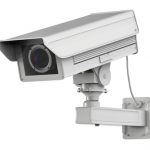Surveillance Cameras in the Neighbourhood

Ben moved into a rental property in July.
He didn’t realise until a few weeks later that his neighbours had installed security cameras which capture not only their own property, but also Ben’s backyard.
The cameras are small and hard to see in the daylight, but Ben can see the red lights at night, which indicate they are turned on.
Big hairy Greek guy
You might remember the ‘Big hairy Greek guy’ – John Penlidis – who became a social media hit when his local council refused to help him with a neighbourhood privacy issue.
When his next-door neighbours refused to install privacy glass as promised, John began to spend as much time as possible naked – cleaning his house, gardening and even exercising.
After a while, John’s neighbours could bear it no more and decided that frosted glass might be a good idea after all.
‘Right’ to privacy?
As John quickly found out – and unfortunately for Ben – there is no ‘right to privacy’ in NSW, nor anywhere else in Australia.
The Privacy Act 1988 (Cth) contains limited protections and enforcement mechanisms – predominantly in relation to accessing and disclosing personal information – and laws exist to protect against trespass to land, private nuisance, harassment, stalking and intimidation.
However, there is certainly no blanket right to privacy on our own land.
Surveillance cameras in NSW
Section 8 of the Surveillance Devices Act 2007 (NSW) contains the offence of installing, using or maintaining and ‘optical surveillance device’ (a camera) without consent.
The section prescribes a maximum penalty five years’ imprisonment and/or a fine of $11,000 for a person who – or a fine of up to $55,000 for a company which – knowingly installs, uses or maintains a camera if this involves:
- entry onto the premises or into the vehicle without the consent of the owner or occupier, or
- interference with the vehicle or other object without the express or implied consent of the person having lawful possession or lawful control of it.
There are also the following exceptions to the offence:
- use in accordance with a range of warrants (search, crime scene),
- use for a search or inspection under terrorism, firearms, restricted premises and registered child sex offender legislation,
- use under emergency authorisation,
- use of police body cameras and Tasers,
- use solely for the retrieval of the device, and
- use that is authorised under Commonwealth law.
Workplaces and intimate filming
There are other laws which place restrictions on certain types of filming.
For example, the Workplace Surveillance Act 2005 (NSW) sets out specific rules relating to surveillance at places of employment.
Places of employment may deploy workplace surveillance, as long as the surveillance does not breach the employees privacy rights. This surveillance can be used to protect company assets, detect theft or fraudulent behaviour and monitor employee behaviour and safety.
However, it is important to note that covert workplace surveillance which takes place without the awareness of employees is strictly prohibited in NSW.
Section 3 of the Workplace Surveillance Act 2005 defines ‘covert surveillance’ as a means of surveillance of any employee while at work for any employer, that is conducted or caused to be conducted by the employer, and is not carried out in compliance with the requirements outlined in Part 2 of the Act.
Under Part 2 of the Workplace Surveillance Act 2005, employers must notify employees at least 14 days before any surveillance begins, detailing the type, method, timing, and duration.
Camera surveillance requires visible cameras and signage, while computer surveillance must follow the employer’s policy. Tracking surveillance must also have clear indicators on tracked items.
Exceptions apply for non-usual workplaces where employees agree to surveillance under specific conditions or where an employer has covert surveillance authority issued by a magistrate for the purposes of monitoring unlawful activity in the workplace.
And there are criminal laws which prohibit certain intimate surveillance, such as the filming of another’s private parts and filming private acts, if it is done without consent and for sexual arousal or gratification.
However, there is no general prohibition against filming another’s premises from one’s own property, or from a public place.
Private nuisance
Ben may, however, wish to seek advice about pursuing a civil claim for ‘private nuisance’.
Private nuisance is where one person “substantially and unreasonably” disturbs or interferes with another’s “ordinary and reasonable” use of land they own or occupy. Unlike trespass, it does not involve physical entry onto the affected person’s land.
In order to succeed, Ben would need to establish that:
- he owns or occupies (eg leases) the home,
- his neighbour interfered with the use and enjoyment of that property, and
- the inference was both substantial and unreasonable.
In determining the extent of interference, the court will ordinarily look at:
- its frequency, nature and extent,
- whether the act is ordinarily to be expected in the area,
- whether it was undertaken in the ordinary course of conduct, rather than maliciously or recklessly.
In addition, Ben would need to prove that his neighbour:
- knew about the nuisance (eg installed the cameras or knew they were there),
- knew or should reasonably have known it was interfering with Ben’s use of property, and
- did not take reasonable steps to prevent it.
Proceedings for nuisance commonly relate to matters such as persistent noise, odours, sewerage, light, dust, vibration, the flow of water and so on.
However, the Supreme Court of NSW found in the case of Raciti v Hughes (1995) found that categories of nuisance are not closed, and that an actionable cause of nuisance arose when the defendant neighbours installed floodlights and surveillance cameras on their property and directed it to film the plaintiff’s backyard.
In that case, Justice Young found the neighbours had made a deliberate attempt to interfere with the plaintiff’s enjoyment of land, and the use of cameras combined with the floodlights represented a “substantial and unreasonable interference”. The judge ordered an injunction to prevent further interference.
However in that case, the degree of interference was arguably significantly higher than that experienced by Ben.
In any event, it is important to bear in mind that civil claims can be expensive where they involve the assistance of a lawyer, and the unsuccessful party may be ordered to pay the legal costs of the successful one. Such proceedings can also be lengthy, time-consuming and stressful.
Parliamentary inquiry
The perceived inadequacy of the law when it comes to surveillance cameras directed towards neighbours was the subject of numerous submissions to the 2015 NSW Parliamentary Inquiry into Serious Invasions of Privacy, which looked at a range of privacy issues.
The Inquiry’s recommendations included that the government:
- introduce a statutory cause of action for serious invasion of privacy,
- broaden the scope of the NSW Privacy Commissioner to hear complaints between individuals relating to alleged serious invasions of privacy, and
- confer jurisdiction on the NSW Civil and Administrative Tribunal (NCAT) to hear claims arising from the proposed statutory offence of serious invasions of privacy.
However, attorney-general Gabrielle Upton rejected these recommendations. She said the government would instead “tweak” criminal laws to ensure they extend to range of serious privacy breaches such as the “non-consensual sharing of intimate images” or “revenge porn”, and would continue in discussions with other jurisdictions including the federal government to create consistent laws across the country.
Apprehended Violence Orders
A potential avenue of recourse for Ben may be to apply for an Apprehended Personal Violence Order (APVO) under section 18 of the Crimes (Domestic and Personal Violence) Act 2007 (NSW) (“the Act”).
That application could be prepared by a lawyer, a ‘chamber magistrate’ by appointment at Ben’s local court or by Ben himself.
In order to succeed, Ben would need to prove that he “has reasonable grounds to fear and in fact fears” personal violence, intimidation or stalking by his neighbours which is “sufficient to warrant the making of the order”.
The Act makes it clear that “intimidation” does not have to involve “actual or threatened violence”, nor to consist of “actual or threatened damage to property”.
I will ultimately be a matter for the court, considering all relevant matters, to decide whether the neighbour’s actions are sufficiently serious to warrant the making of an AVO.
Those considering applying for a private AVO should also be aware that getting a lawyer involved can be expensive, and they may be ordered pay the other person’s legal costs if unsuccessful.
Police AVOs and the crime of ‘stalking or intimidation’
If the situation became particularly serious, Ben might consider making a complaint to the police.
If police thought the situation was indeed serious, they might consider applying for an AVO on Ben’s behalf. It is often better to have police apply for an AVO than to apply for one yourself, as there are no legal costs involved ie there is no need for a lawyer and costs cannot be ordered against you.
In some cases, police may even consider pressing criminal charges. For example, section 13 of the Act makes prescribes a maximum penalty of five years’ imprisonment and/or a fine of $5,500 for anyone who “stalks or intimidates another person with the intention of causing the other person to fear physical or mental harm”.
The offence does not require proof that the affected person actually feared harm.
The Act defines “stalking” to include “the following of a person about or the watching or frequenting of the vicinity of, or an approach to, a person’s place of residence, business or work or any place that a person frequents for the purposes of any social or leisure activity.”
“Intimidation” may include:
- harassment or molestation, or
- an approach by any means (including by telephone, telephone text messaging, e-mailing and other technologically assisted means) that causes the person to fear for his or her safety, or
- conduct causing a reasonable apprehension of injury, violence or damage to person or property.
The court may consider a pattern of conduct when determining whether it amounts to stalking or intimidation.
Perhaps unfortunately for Ben, it is unlikely the prosecution would be able to prove this offence beyond reasonable doubt given the circumstances of the case.
Best to work it out
Given the limited protections against privacy intrusions by neighbours, it is often best to try and work the issue out without interference from a tribunal, court or police – or through the help of a community justice centre, which can provide free, quick and informal mediation services for neighbourhood disputes.
After all, you still have to live near one another.






